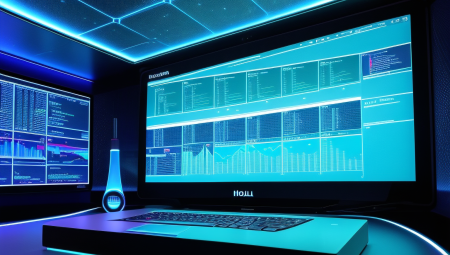In today’s fast-paced world, the healthcare industry is continuously evolving, thanks to the rapid advancement of technology. From wearable devices to telemedicine and artificial intelligence, the future of healthcare is becoming more efficient, accessible, and personalized. In this blog post, we will explore the exciting world of health technologies that are shaping the way we approach medical care. From revolutionizing healthcare with wearable devices to transforming healthcare experiences with virtual reality, the possibilities seem limitless. We will also delve into the potential of robotics in healthcare, the future of drug delivery with nanomedicine, and the groundbreaking concept of biohacking. Additionally, we will discuss how blockchain is securing data integrity and privacy in healthcare and how smart hospitals are integrating technology for improved patient care. Join us as we embark on a journey into the future of healthcare and discover the incredible innovations that are making a significant impact on the way we approach health and well-being.
Table of Contents
Wearable Devices: Revolutionizing Healthcare
In recent years, the advent of wearable devices has had a profound impact on the healthcare industry, revolutionizing the way we monitor and manage our health. These devices, which can be worn on the body and are equipped with sensors and connectivity capabilities, are transforming the healthcare landscape by providing real-time data and insights into patients’ health status.
One of the most significant benefits of wearable devices is their ability to enable remote monitoring and telemedicine, allowing healthcare providers to keep track of patients’ vital signs and other health parameters from a distance. This has been especially valuable during the COVID-19 pandemic, as it has allowed for the continuous monitoring of patients while minimizing the risk of exposure to the virus.
Furthermore, wearable devices are empowering individuals to take control of their own health by providing them with access to personalized health information and insights. From tracking activity levels and sleep patterns to monitoring heart rate and blood pressure, these devices are enabling users to make informed decisions about their health and wellness.
With the continuous advancements in technology, wearable devices are expected to play an even greater role in revolutionizing healthcare in the future, as they continue to evolve and expand their capabilities to monitor and manage a wide range of health conditions.
Telemedicine: Bridging the Gap of Distance
Telemedicine is a revolutionary concept that has transformed the way healthcare is delivered, especially in remote areas where access to medical facilities is limited.
Through the use of telecommunication and information technology, healthcare professionals are able to diagnose, treat, and monitor patients from a distance.
This has significantly improved access to medical services for individuals living in rural or underserved areas, where healthcare facilities are often scarce or too far away.
By bridging the gap of distance, telemedicine has made it possible for patients to receive timely and quality healthcare without having to travel long distances.
Artificial Intelligence in Medicine: Enhancing Diagnosis and Treatment
Artificial Intelligence (AI) has become an integral part of the healthcare industry, revolutionizing the way we diagnose and treat medical conditions. With the ability to analyze large sets of patient data in a fraction of the time it would take a human, AI is enhancing the accuracy and efficiency of medical diagnosis.
Moreover, AI algorithms are also being used to personalize treatment plans for patients. By analyzing genetic and environmental factors, AI can suggest tailored treatment options based on individual patient profiles, leading to more effective and targeted therapies.
Furthermore, AI is revolutionizing medical imaging, allowing for faster and more accurate interpretations of X-rays, CT scans, and MRIs. This not only streamlines the diagnostic process but also enables early detection of diseases, leading to better patient outcomes.
As AI continues to advance, it has the potential to transform the way healthcare practitioners deliver care, ultimately improving patient experiences and outcomes. With its ability to process vast amounts of data and provide personalized insights, AI is at the forefront of enhancing diagnosis and treatment in medicine.
Virtual Reality: Transforming Healthcare Experiences
Virtual reality (VR) technology has transformed the way healthcare experiences are delivered, offering new solutions for both patients and healthcare professionals. Through the use of VR headsets, patients can immerse themselves in a virtual world, helping to distract them from pain and anxiety during medical procedures. This technology has been particularly beneficial in the field of mental health, offering immersive environments for therapy and exposure treatment for phobias and PTSD.
Furthermore, virtual reality has revolutionized medical education and training, allowing students and healthcare professionals to practice procedures in a simulated environment. Surgeons can use VR to plan and practice complex surgeries, improving their skills and reducing the risk of errors during actual procedures. This technology has also been utilized for patient education, using interactive VR experiences to explain medical conditions and treatment options in a more engaging and understandable way.
In addition, virtual reality has enabled remote healthcare experiences, allowing patients to virtually visit healthcare facilities and consult with specialists without physically being present. This has been especially valuable for individuals in rural or underserved areas, bridging the gap of distance and improving access to specialized care. VR technology has also been used to improve the emotional well-being of patients, providing immersive experiences and relaxation environments, particularly for those in long-term care or hospice settings.
Overall, virtual reality has significantly transformed healthcare experiences, offering innovative solutions for patient care, medical education, remote consultations, and emotional well-being. As technology continues to advance, VR is expected to play an increasingly important role in enhancing the overall healthcare experience for both patients and healthcare professionals.
Robotics in Healthcare: From Surgical Assisting to Elderly Care
In recent years, robotics has made significant strides in the field of healthcare, with applications ranging from surgical assisting to elderly care. One of the most prominent uses of robotics in healthcare is in surgical procedures. Robotic-assisted surgery allows for greater precision and control, leading to improved outcomes for patients. Surgeons are able to perform complex procedures with enhanced dexterity and minimal invasiveness, resulting in reduced pain and faster recovery times for patients.
Furthermore, robots are being increasingly utilized in elderly care to provide support and assistance to the aging population. From helping with daily tasks to providing companionship, robotic devices are helping to improve the quality of life for elderly individuals. These robotic companions can also monitor vital signs and provide alerts in case of emergencies, offering peace of mind to both the elderly and their families.
Another area where robotics is making a significant impact is in rehabilitation therapy. Robotic exoskeletons are being used to help patients recover from injuries and improve mobility. These devices provide support and assistance during physical therapy, allowing patients to regain strength and function.
As technology continues to advance, the potential for robotics in healthcare is vast. From enhancing surgical procedures to improving the lives of the elderly, robots are playing an increasingly important role in the delivery of healthcare services.
Genetic Testing: Unlocking Personalized Medicine
In recent years, genetic testing has emerged as a groundbreaking tool in the field of medicine, offering an unprecedented level of personalized care to patients. By analyzing an individual’s genetic makeup, healthcare professionals can gain valuable insights into a person’s predisposition to certain diseases, as well as how their body might respond to particular treatments. This has the potential to revolutionize the way we approach healthcare, allowing for more targeted interventions and improving overall patient outcomes.
For instance, individuals with a family history of genetic diseases such as cancer or heart disease can undergo genetic testing to assess their risk factors and take proactive steps to mitigate these risks. Moreover, with the advancements in technology, genetic testing has become more accessible and affordable, enabling a wider demographic to benefit from this personalized approach to medicine.
Furthermore, the insights gained from genetic testing also have significant implications for drug development and treatment efficacy. By understanding how individuals metabolize certain medications based on their genetic profiles, healthcare providers can prescribe medications with greater precision, minimizing the likelihood of adverse reactions and optimizing therapeutic benefits.
As the field of genetic testing continues to evolve, it holds the promise of unlocking new frontiers in personalized medicine, providing a roadmap for tailored prevention, diagnosis, and treatment strategies that are uniquely tailored to each individual’s genetic composition.
Nanomedicine: The Future of Drug Delivery
Nanomedicine is revolutionizing the way drugs are delivered to the human body. By harnessing the power of nanoparticles, scientists and researchers are able to develop new methods for targeting specific cells and tissues, resulting in more effective and efficient treatment options for patients.
This cutting-edge technology is paving the way for personalized medicine, as it allows for the precise delivery of therapeutic agents to the site of action, minimizing potential side effects and maximizing treatment efficacy. Nanomedicine holds the promise of transforming the pharmaceutical industry and improving patient outcomes across a wide range of medical conditions.
Furthermore, the development of nanocarriers and nanoscale delivery systems is opening up new avenues for drug delivery, including the potential for oral and transdermal administration of medications that were previously only available through injections. This has the potential to improve patient compliance and quality of life, as well as reduce healthcare costs associated with traditional drug delivery methods.
As nanomedicine continues to advance, it is poised to play a central role in the future of drug delivery, offering new hope for the treatment of diseases and conditions that have proven challenging to address with conventional pharmaceutical approaches.
Biohacking: Pioneering Human Enhancement
Biohacking is a fascinating and controversial field that involves individuals and groups using biology, biotechnology, and genetic engineering to enhance their cognitive, physical, and physiological abilities. It encompasses a wide range of activities, from DIY biology experiments to the use of implants and other technologies to modify the body. Biohackers are driven by a desire to push the boundaries of what it means to be human, and their work has the potential to revolutionize healthcare and human enhancement.
One of the most exciting aspects of biohacking is its potential to unlock personalized medicine. By utilizing genetic testing and other technologies, biohackers can gain a deeper understanding of their own biology and use this information to optimize their health and performance. This has the potential to revolutionize the healthcare industry, shifting the focus from treating diseases to preventing them and optimizing individual wellness.
However, biohacking is also a controversial and ethically complex field. Critics argue that it raises serious safety, privacy, and equity concerns, and that it could exacerbate existing disparities in access to healthcare and enhancement technologies. There are also concerns about the potential for unintended consequences and the long-term impact of biohacking on human health and society.
Despite these challenges, biohacking has the potential to pave the way for groundbreaking advancements in human enhancement and personalized medicine. As technology continues to advance, it’s important to have thoughtful discussions and ethical guidelines in place to ensure that biohacking is used responsibly and for the benefit of all.
Blockchain in Healthcare: Securing Data Integrity and Privacy
Blockchain technology is revolutionizing the healthcare industry by providing a secure and efficient way to store and share patient data. One of the biggest challenges in healthcare is ensuring the integrity and privacy of medical records, and blockchain offers a solution to this problem.
By using blockchain technology, healthcare providers can create a secure and tamper-proof record of patient information. Each block in the chain contains a timestamp and a link to the previous block, making it virtually impossible to alter or delete data without detection.
This level of security is crucial in an industry where patient confidentiality is of utmost importance. With blockchain technology, patients can have confidence that their medical records are safe from unauthorized access or tampering.
Furthermore, blockchain can also streamline the process of sharing medical data between different providers, improving the coordination of care and ultimately leading to better patient outcomes.
Smart Hospitals: Integrating Technology for Improved Patient Care
Smart hospitals are revolutionizing the healthcare industry by integrating cutting-edge technology to improve patient care.
From electronic health records and telemedicine platforms to advanced monitoring systems and robotic surgical assistants, smart hospitals are utilizing Artificial Intelligence, Blockchain, and Internet of Things (IoT) to enhance medical services and streamline operations.
By leveraging these technologies, smart hospitals are able to provide personalized and efficient care, reduce medical errors, and improve patient outcomes. The integration of technology also allows for better communication and collaboration among healthcare professionals, leading to more coordinated and comprehensive care for patients.
Overall, the integration of technology in smart hospitals is playing a crucial role in transforming the healthcare experience and ultimately improving patient care.




